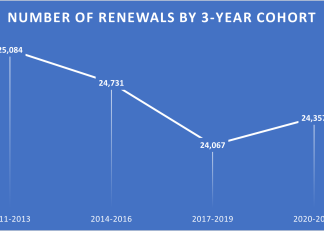Press Release
Contact
Renewals for educator credentials are on the rise
Two years of increases show favorable trend
CONCORD, NH — While there are numerous reports of a serious national teacher shortage, New Hampshire is better off than its counterparts, especially throughout the past two years.
As of today, the New Hampshire Department of Education has renewed 8,350 educator credentials, which is higher than last year’s number of 8,232 renewals. Educators are required to renew their credentials every three years in New Hampshire, meaning there are three cohorts of renewals that are ongoing. About 25,000 individuals currently hold a renewable educator credential in the state – with about one-third of them required to renew each year. In addition, an extra 3,000 individuals hold a professional license-for-life that does not require renewal, but was phased out several decades ago.
“For the past twelve years, New Hampshire has processed an average of 8,182 renewals each year, and in both 2021 and 2022 we have surpassed that number. When some areas of the nation are struggling to fill teacher positions, here in New Hampshire the number of educators has increased steadily throughout the past two years,” said Frank Edelblut, commissioner of education. “Since 2020, New Hampshire has had a net gain of about 300 credentialed teachers. Of course, that does not immediately translate into ease of recruitment for our schools, but it certainly signals that we are in a better place than others.”
Aside from an increase in educator renewals, the state’s Critical Shortage List has shown substantial improvement since 2019. The Critical Shortage List, which is an analysis of the teacher supply and demand in New Hampshire, was updated in April by NHED based on input from school leaders across the state. There are currently 26 out of 54 endorsements that have been identified as critical staffing shortage areas in the state, which does not include paraprofessionals or substitute teachers. For comparison, there were 50 out of 54 endorsements identified as critical shortage areas in 2019. Under current NHED rules, school leaders have the ability to identify a localized critical shortage, although only four school districts have made that declaration for a total of six positions.
“While there may be teacher shortages in certain subjects and certain locations throughout New Hampshire – specifically special education, paraprofessional, and STEM positions – the educator shortage has not worsened, overall. Instead, it has improved during the past two years,” said Stephen Appleby, director of NHED’s Division of Educator Support and Higher Education. “This is a favorable trend given the many educational challenges that resulted from the pandemic.”
Despite two consecutive years of increases, renewals for educator credentials have declined an overall 3.1 percent throughout the past twelve years in New Hampshire. During that same timeframe, however, the student population has decreased by 13.1 percent. Educator renewals were at their lowest in 2020 with 7,775 renewals, and at their highest in 2015 with 8,397 renewals.




